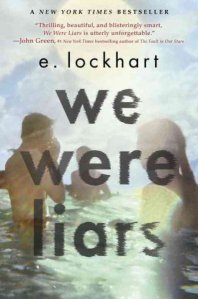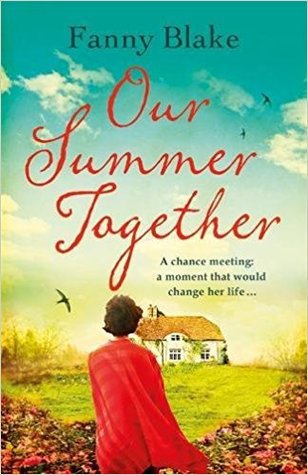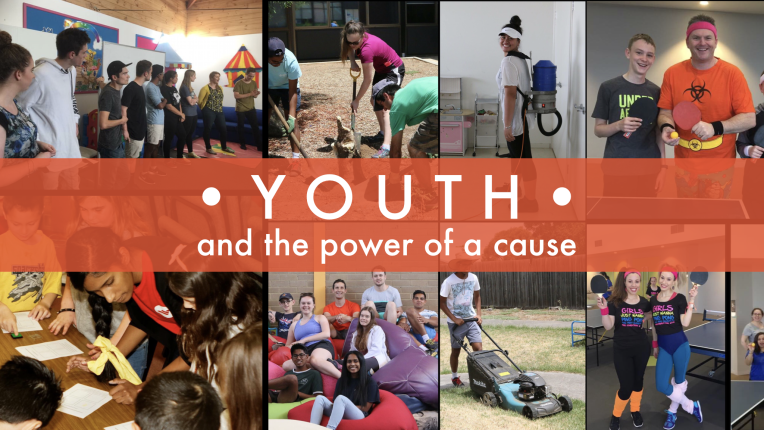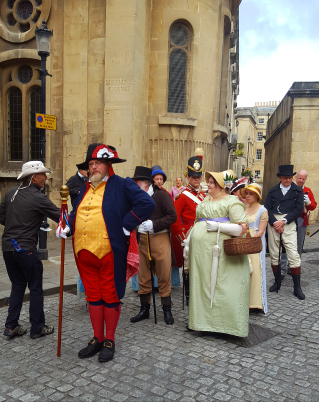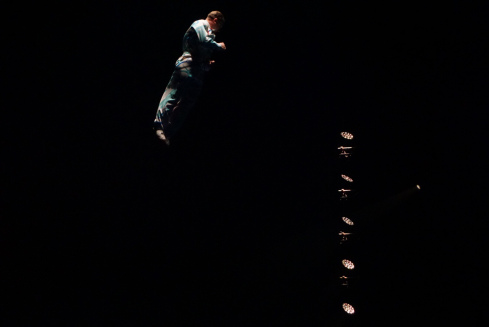This is the discussion, including spoilers, of The Blackbird Season by Kate Moretti. For the review, click here.
The novel takes place in the span of about a month during the spring, just before Lucia and her friends will graduate from high school. The only time it really strays from this is with a few journal entries from Lucia, most dated “forever ago” which it turns out is more like two years ago. But even with the story confined to those few weeks, Moretti manages to weave backstory into the present time flawlessly. For example in Chapter 3, as Bridget sits down to a TV dinner alone at home, she thinks about her late husband and how particular he was with food, and we see the emotional conflict between the freedom to eat whatever garbage she wants with the crushing weight of missing him. Or again in Chapter 5: “There was only one charming little coffee shop, which Bridget did not go to because each cup of coffee smelled like Holden on a Sunday morning, sleepy, slightly sweaty, with the distinct air of newspaper ink…”
The writing is good, descriptive, and building. “She looked around, and even the recruiters — men in sports jackets or windbreakers, with clipboards, their radar guns tapping nervously against their thighs — watched the sky with an open mouthed, gaping wonderment.”
Initially, the story had the feel of magic, but the sense of normalcy too, as Moretti describes the everyday details alongside this anamolous event: thousands of starlings falling out of the sky, dead. Unfortunately, this feeling doesn’t permeate the entirety of the novel, but falls to the wayside as the plot trudges on towards the drama surrounding normal people in the small town of Mt. Oanoak. The first few chapters hold such promise that the rest seems almost destined to fall short. And, fittingly, it seems to parallel the lives of our protagonists, who all disappoint one another in their own ways; heroes built to fall. The lovable baseball coach turned into a predator at worst, a neglectful family man at best. The mysterious young woman turned into a spiteful, jealous runaway. But the beginning builds with such a crescendo that it’s impossible not to be drawn into the lives within this rotting town; the ominous, yet wry hints from the narrator about the events yet to unfold before us.
“Until, of course, more important questions arose, at which time everyone promptly forgot a thousand birds fell on the town of Mt. Oanoak at all.”
And, as is so often the case in real life, the people who seemed so extraordinary at the outset become ever more ordinary as we peel back the layers. Sometime between chapters 15-20, Moretti has perfectly captured the mundanity and bitterness of a fraught marriage. Alecia and Nate fight. Alecia says to him, “Fuck you.” Nate replies, “Fuck me? Nah, that’s not a thing you do anymore.”
Ohhh, damn. Shots fired!
At 63% in, the creepy, mystical side of the story is finally brushed aside altogether with the explanation that the birds that died were poisoned from berries that had grown by The Mill, arsenic leeching up through the roots.
The Mill. It serves almost as a character in the story, certainly more than just a setting. It’s to be blamed for so much. Nearly collapsing the economy of the town, corrupting the youth who gather to party in the abandoned building, even killing Nate’s own father who collapsed at work when Nate was young. When it was in its heyday, it emitted an odor that permeated the city, smelling similar to natural gas. “If you were an Oanoaker for life, you learned to like the smell. ‘Making paper, making money,’ they’d say.” My hometown has a similar plant, making products from soybeans and corn. Some days it smells like wet dog farts, others like corn flakes cereal. The smell of money, indeed. That plant has been the only thing sustaining that town for decades.
35. Bridget is milling about the Mill (see what I did there?), with all this big machinery. We’re definitely going to stumble on Lucia’s body. Ok, not her body but her backpack.
Lucia is missing for 9 days and hardly anyone is actually looking for her. Her dad came back from his month-long bender only to hide out in the woods. Nate later speculated that he was waiting for her there, hoping to see her, knowing she’d be in the woods somewhere. When Lucia’s body is finally found, it’s not a shock. The build up was there. But what is shocking is what happened to her. We spend so much time on this slow-burning witch-hunt of Nate. The reporter photographing him outside the hotel. The bank statements of his hotel room purchases. Alecia’s estrangement in the fall-out. Her struggle (or sometimes lack thereof) to care for her autistic son in Nate’s absense. And what does Nate do with all his free time after he’s put on suspension from his job? No, that’s a legitimate question; I really want to know. Because he has a lot of time in his hands and we only ever see him walk the woods once or twice. The rest of the time his whereabouts are speculated on by his friends — the gym, hiking, sleeping. But when it really counts — that scientically proven time frame detailed by forensic evidence — he is with his wife, and can prove it. We circle like vultures around the death of trust, questioning what to believe, questioning our own feelings even. But in the end, Nate had nothing to do with Lucia’s death.
32. After Bridget finds the video of Andrew molesting an inebriated Lucia, she takes it to Nate who corroborates it. Lucia had confided in him what happened. She was raped. (The video cuts off before it gets graphic.) He laments having told her straight up: “I don’t believe you.” I’m starting to think Lucia killed herself and set Nate up for the fall. What I’d hoped to be an atmospheric thriller with a touch of magical realism has turned into a high school drama in the vein of Thirteen Reasons Why.
Lucia didn’t kill herself. Really she pretty much Gone Girl-ed herself. Disappeared on purpose to let the town tear apart Nate’s reputation and his marriage, with the intention of returning once the dust settled. Her death was tangential. And while the rest of Moretti’s characters are three dimensional — flawed but likeable — Taylor, our killer and Lucia’s best friend, is the archetypal Big Baddie. She’s shallow, jealous, possessive, and without conscience. Your run-of-the-mill psychopath. She pushed her best friend off of the dam into the rushing water — not in the heat of an argument, not by some unfortunate accident or misunderstanding — but with pure malice, with the intent to kill her. To protect the reputation of her would-be boyfriend, who she’d been hooking up with for all of a half a day. Andrew: Nate’s student pet, star baseball player, Taylor’s ticket out of Mt. Oanoak, Lucia’s friend, crush, rapist.
End. Though all the loose ends have been tied up, there is nothing neat and tidy in the ending. The future is cloudy. It’s very realistic in that way — the way that an ending and a beginning often feel the same way. The doubt, the injustice, the uncertainty.
And it comes down to this: the true horror of this novel lies in the unremarkable short story of a good guy who does something atrocious to his own friend. The horror of the teacher who doesn’t believe the victim; the town who would ostracize a troubled young woman; the friend who turns her back in favor of a love interest; teens so enraptured with social media that they would live-stream the forced sexual coercion of an incapacitated female; and, most importantly, a priveledged white male with a bright future, nice enough, but the entitled belief that he can just take whatever (or whomever) he wants whenever he wants it.
The truly scary part is how bored I was with this conclusion, because it was just so unremarkable, so ordinary, so commonplace that it felt unoriginal, tired, played-out, almost not even worth writing about.
I like to think of this as a reflection of society rather than my own self. It’s easier to see it as a societal problem than to take ownership. But that’s the problem with our current rape culture. We have to do better as individuals. Because it is individuals that are committing these acts. *Our sons, our brothers, our best friends. That’s the reality for so many young women who have been sexually assaulted. 70% of sexual violence is committed by an acquaintance, friend, or current or former partner of the victim, according to researched data compiled by RAINN in 2016.
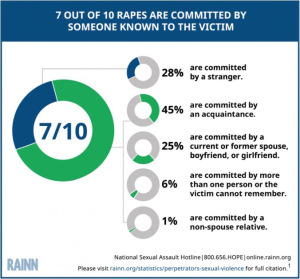
I’d like to imagine a utopian future where the end of this novel is such a far-flung piece of historical fiction that readers are appalled at our barbarism. Because the reality is grim: A thousand birds can fall dead from sky but still men go on raping.
*Use of the male pronoun here is only for clarity and brevity. Assault comes in a myriad of gender identities and sexual orientations.
Advertisements Share this: